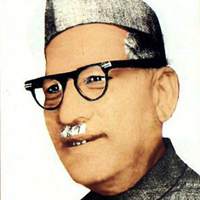Profile of Ali Abbas Husaini
Pen Name : 'Ali'
Real Name : Sayed Ali Abbas Husaini
Born : 03 Feb 1897 | Ghazipur, Uttar pradesh
Died : 23 Sep 1969 | Lucknow, Uttar pradesh
Relatives : Syed Azam Husain Azam (Nephew)
Ali Abbas Hussaini is well-known as a short story writer, playwright, and critic. He was born on 03 February, 1897 in a village called Para in Ghazipur district of Uttar Pradesh. He got his degrees of Matriculation and Intermediate from Mission High School, Allahabad. After graduating from Canning College, Lucknow, he took his M. A. in History from Allahabad University. Subsequently, he taught at Government Degree College, Lucknow. He retired from this college as its Principal in 1954. Hussaini passed away on 27 December, 1969.
Stories inflamed Hussaini’s imagination right from his childhood. He had finished reading stories from Alif laila, Firdaus’s Shahnameh, Tilism-e Hosh Ruba, and other classical collections of stories quite early in his life. In 1917, he wrote his first story entitled “Ghuncha-i-Nashaguftah” and in 1920 he penned a romantic novel entitled Koh-e Qaaf ki Pari under the pen name of Sir Syed Ahmad Pasha. Shayad ke Bahaar Aaye was his second and last novel. He put together his stories in collections entitled Rafeeq-e Tanhai, Baasi Phool, Kaanton Mein Phool, Mela Ghoomani, Nadia Kinarey, ICS aur Doosrey Afsaaney, Yeh Kuchch Hansi Naheen Hai, Uljhey Dhaagey, Aik Hammam Mein, and Sailaab ki Raatein.
His plays were put together in Aik Act ke Dramey. Hussaini earned a name as a fiction critic as well. He was the first to write a book on the history and criticism of novel as a literary genre. He collected his critical essays in a book called Uroos-e Adab.

